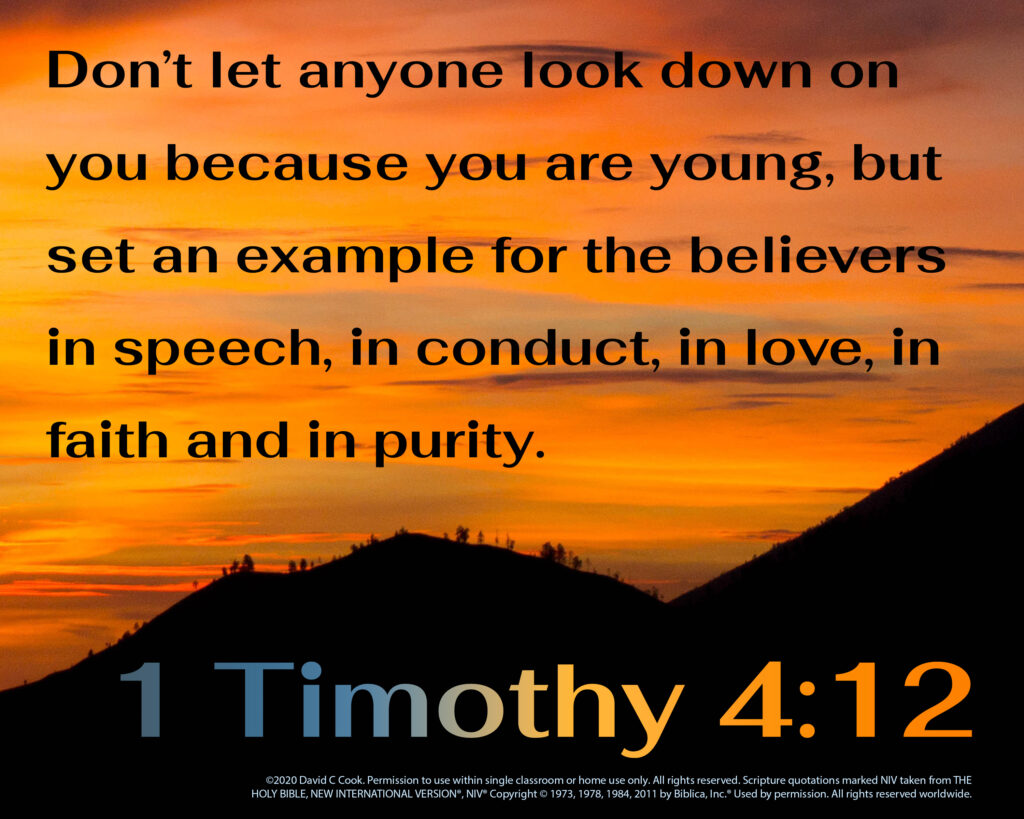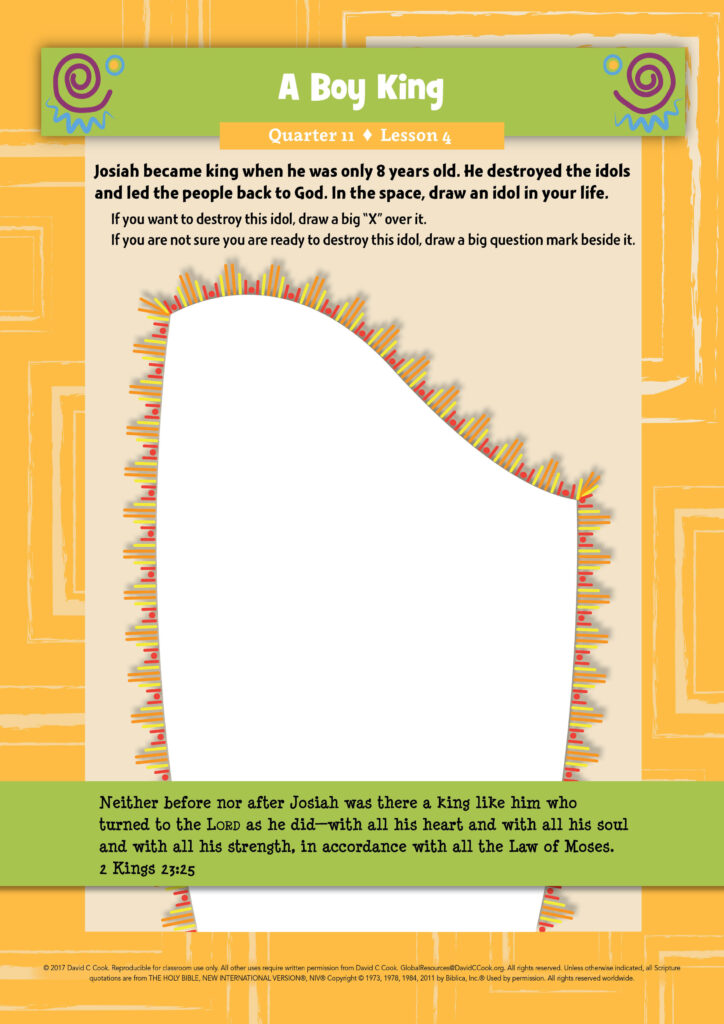During the lesson, the information for you to know is written in regular type, and what we suggest speaking or reading aloud to children is in bold. All resources for this lesson, including the Teacher Guide, Student Page, Family Connection Card, and other resources can be downloaded in a ZIP file by clicking on the following link:
In some lessons you will find "resource articles." These are articles written by experts from around the world to help equip you for your work with children and adolescents. Share them with parents or guardians if you consider it appropriate.
Josiah was eight years old when he became king, and he reigned in Jerusalem thirty-one years. He did what was right in the eyes of the Lord and followed the ways of his father David, not turning aside to the right or to the left.
2 Chronicles 34:1–2
Many times we look at children and think they are too young to be used for good. We may feel that way about ourselves. We do not think we can influence others for good because we think we have nothing worthwhile to offer. Yet God shows us through the life of a young boy that He can use anyone, even those others would dismiss.
Is there anything in your life that you think prevents you from doing what is right? Do as Josiah did and clean out any idols or other things that would keep you from following the Lord with your whole heart. Remember that God can use you in mighty ways to influence many—starting with the children
you teach!
Let the families know that this week the children will learn the story of Josiah, the boy who became king at 8 years old. Encourage them to ask their children to share how they can be good examples to influence others too.
Teacher Tip: If possible, email or text the Family Connection Card to the families of your students.
Welcome each child by name as she arrives. Ask the children who the people are that they are connected to. It could be family members, trusted adults or friends. Ask each child to share 2 people he is connected to.
We are all connected to someone! Let’s connect with each other by making a human knot.
Everyone stand in a tight circle—standing shoulder to shoulder and facing the middle of the circle. Reach across the circle to hold the hands of 2 different people. You cannot hold the hands of those next to you. You have formed a human knot. The goal of this game is to untangle without letting go of the hands you are holding.
Now you will work together to untangle this human knot. You cannot let go of the hands you are holding, but you can adjust your grip if needed. You may have to bend and twist to untangle. You will need to work together and talk about the best way to untangle yourselves.
Here are some tips to help you. You may want to all take a step back, without letting go of hands, so that you can see how to untangle better. Look for where people may untangle the easiest as a place to start. Be sure you move gently so no one gets hurt. When you have untangled, you will have an unbroken circle of joined hands. Some will be facing inside the circle and some will be facing outside the circle.
Give children 5 minutes to untangle their human knot. If they do not succeed, that is okay! Affirm their efforts and teamwork. Ask the children to sit down.
All of you were connected in this activity. One person’s movement affected everyone else in the circle. We are all connected in real life too. Each of our actions affects someone else, even when we do not realize it. Even as children, your actions can affect many others, either for good or for evil. Today you will hear about a boy king who changed an entire nation.
Optional: If possible, share the images from The Action Bible.
I will now tell you about a boy who became king when he was only 8 years old! As I tell this true story, listen for what was good and for what was bad. If someone did something displeasing to God, shout “Evil!” If someone did something that was pleasing to God, shout “Godly!”
For a long time, the nation of Israel was ruled by evil kings. They broke God’s law. They forgot about God and worshipped idols like the other nations around them. They sacrificed their children to the idols. They were unkind to the poor and widows. They lied and stole and cheated.
Children should shout “Evil” after each statement above.
All the people followed the example of these evil leaders. Even the priests, whose job was to point the people to God, followed the example of these evil kings. They neglected the house of God. They forgot about worshipping God. All the people did whatever they wanted, even when they knew it was wrong.
Children should shout “Evil” after each statement above.
When King Amon died, his son Josiah became king, even though he was only 8 years old. Josiah’s father and grandfather had done evil things.
Children should shout “Evil” after each statement above.
Do you think the boy Josiah will follow the adults around him or do something different?
Listen to what the Bible says about King Josiah:
Josiah was eight years old when he became king, and he reigned in Jerusalem thirty-one years. He did what was right in the eyes of the Lord and followed the ways of his father David, not turning aside to the right or to the left.
2 Chronicles 34:1–2
If you are using the Memory Verse Poster, show it to the students.
Don’t let anyone look down on you because you are young, but set an example for the believers in speech, in conduct, in love, in faith and in purity.
1 Timothy 4:12

Remind the children to shout “Godly” after each of the following paragraphs. Pause between the paragraphs so they know when to shout “Godly.”
Josiah did what was right, even though all the adults around him were doing what was evil. Josiah did what was right in the eyes of the Lord. He loved God and wanted to obey Him. Listen to all the things Josiah did that were right.
Josiah began seeking God while he was still young. He led the people to destroy the places of idol worship all over the nation. When he was 25 years old, Josiah instructed the priests to clean out the temple and repair it. People brought money to the temple, and Josiah told the priests to use it to pay skilled workmen to repair the temple.
While this was happening, some men found a book of God’s law. They brought the book to King Josiah. He asked them to read it to him. When he heard God’s Word, he was so upset that the people had not been honouring God that he tore his clothes and wept in grief. He knew that the people deserved God’s anger.
He called all the people together and had God’s Word read aloud so everyone could hear it. Then King Josiah promised to follow God’s ways. He led the people in repenting from their evil ways. He led them to renew their promise to follow God again. Listen to what God said to King Josiah:
Because your heart was responsive and you humbled yourself before God when you heard what he spoke against this place and its people, and because you humbled yourself before me and tore your robes and wept in my presence, I have heard you, declares the Lord.
2 Chronicles 34:27
Why did God say that He heard Josiah?
Because Josiah responded to God’s Word and humbled himself.
Josiah led the people in a great celebration of God’s faithfulness. It was the greatest celebration that had been done for many, many generations. King Josiah ruled wisely for 31 years. Listen to what was said about King Josiah:
Neither before nor after Josiah was there a king like him who turned to the Lord as he did—with all his heart and with all his soul and with all his strength, in accordance with all the Law of Moses.
2 Kings 23:25
Thank you for cheering for all the good things King Josiah did. Because he became king when he was a young boy, it could have been easy for him to follow the evil ways of his father and grandfather, but he did not. Let’s think about what we can learn from the boy who became king.
It is usually older people who show the young the right way to behave and what to do. But as we saw in Josiah’s life, young people can show older people the right things to do. Children and young people can lead others to obey and follow God.
We also see that Josiah chose to do what was right even when others around him were doing wrong. You can also choose to do what is right and honour God even when others around you do not.
Optional: If you are using The Action Bible, have the children read the stories on pages 446–448.
You probably know people who love God and try to do what is right. But you probably also know people who do what is wrong. You may feel like there is nothing you can do to change the people who do wrong. But God shows us through Josiah’s story that even a child can have a big influence. You may be young, but you can be mighty in God’s plan!
Josiah destroyed the idols because the people were worshipping them instead of God. In the story, the idols were statues of false gods. But not all idols are statues. Idols can be anything we consider more important than God or anything we trust more than we trust God. For example, some people trust money more than they trust God. For them, money is an idol.
Give each child a leaf.
Your leaf represents the idols in your life. They may be statues that we worship. They may be things that we trust more than God, such as money or power. They may be things we think are more important than God, such as getting good grades or pleasing our friends.
I do not want you to answer these questions out loud. Just think about them silently.
Because Josiah was humble and responded to God’s Word, God heard him. That is all it takes for God to hear you too!
Optional: If you are using Student Pages, there is space for children to draw the idols they want to destroy.

Close the class by speaking this blessing based on 2 Kings 23:25 over the children.
Blessing: God loves you. He says that even as a child you can influence others for good. May you turn to the Lord with all your heart and soul and strength.
Lead the children in singing this quarter’s song, if possible.
Life on Life ©2020 David C Cook. Reproducible for home or classroom use only. All other uses require written permission from David C Cook [email protected]. All rights reserved.